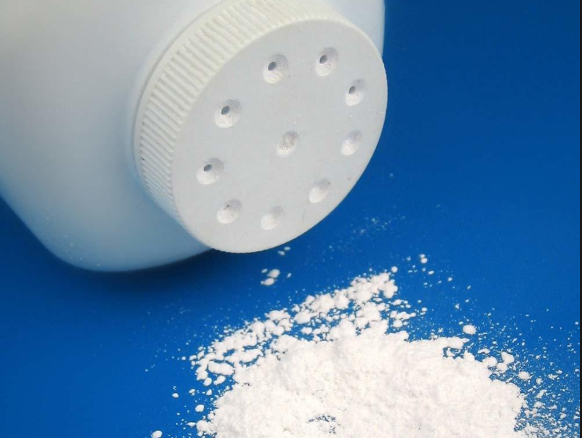
A drug and consumer products company has been ordered to pay Sh473 billion to 22 women who claim the firm’s powder contributed to them developing ovarian cancer.
Johnson & Johnson was punished with the hefty fine but the judgment will interest Kenyans given in almost every beauty shop or supermarket in the country, you will find Johnson’s Baby Powder and Shower to Shower, an absorbent body powder
It is commonly used to soothe skin irritation in children and women.
On women, it is used around the genitals to absorb moisture and reduce odour.
Men are also regular consumers as it is applied on the chin when shaving beards.
However, the powder’s main ingredient, talc, is causing ripples in the West with accusations of having cancer-causing agent. Talc is mined then ground into a fine white powder.
A jury in St Louis Circuit Court last Friday ordered Johnson and Johnson to pay $4.7 billion to 22 women who are believed to have contracted ovarian cancer by applying the powder overtime.
In total, the firm is facing 9,000 claims but has consistently denied that its powder contains deadly carcinogen known as asbestos.
The two minerals often occur naturally near each other.
In the case, the plaintiffs claimed asbestos fibers and talc particles were found in the ovarian tissues of many women.
They claimed that although the firm knew about the connection between its product use and cancer, it never labeled the same as a caution or warned consumers about the risk they were exposing themselves to.
One of the women, 73-year-old Gail Ingham testified that she was diagnosed with stage three ovarian cancer in 1985 which she had to fight for over a year.
Another plaintiff, Cecilia Martinez, who was diagnosed with cancer in 2011, said her suit was meant to protect mothers and babies.
“I hope that the company will operate with honesty, integrity and do the right thing even when no one is watching,” she said.
Stay informed. Subscribe to our newsletter
Their lawyer Mark Lanier claimed Johnson and Johnson had covered up evidence of asbestos in its products for more than four decades.
Lanier in his closing argument told the jury that the company’s internal company documents revealed that its management knew of asbestos in products but it stayed tight-lipped over the years.
“Your voice is not just the voice of the community but the voice of the world. You don’t joke with people’s lives like this. It’s just not right,” said Lanier.
Johnson and Johnson in its website says that besides its use for skin care, its applied as a light coating on chewing gums in and sweets in order to prevent them from sticking on wrappers coating.
In addition, the firm claims that the same is used to polish rice grains and improves oil clarity and quality.
It is also allegedly used in soaps to enhance skin care and also as coating in tablet medicines to prevent them from caking.
But the irony of talc is that Johnson & Johnson in its website says that it helps lung cancer patients by ensuring that there is no fluid buildup between the lungs and chest wall.
It is claimed it also helps prevent fluid buildup in the lungs of patients suffering from fibrosis.
The firm after the verdict said it was disappointed as some of the 22 allegedly could not prove a link between its product and cancer.
“Johnson & Johnson is deeply disappointed in the verdict, which was the product of a fundamentally unfair process that allowed plaintiffs to present a group of 22 women, most of whom had no connection to Missouri, in a single case all alleging that they developed ovarian cancer,” said the firm in the statement released the day of the verdict.
Baby powder
In the case, the firm argued that over the years it had trained its employees to ensure that asbestos will never be in its iconic baby powder.
“The result of the verdict, which awarded the exact same amounts to all plaintiffs irrespective of their individual facts, and differences in applicable law, reflects that the evidence in the case was simply overwhelmed by the prejudice of this type of proceeding. Johnson & Johnson remains confident that its products do not contain asbestos and do not cause ovarian cancer and intends to pursue all available appellate remedies,” added the firm.
It is not the first time the firm is facing consumers over the powder. There are six other cases which had been decided and in favour of the consumers.
Some have, however, been overturned by the US appeal court.
 The Standard Group Plc is a
multi-media organization with investments in media platforms spanning newspaper
print operations, television, radio broadcasting, digital and online services. The
Standard Group is recognized as a leading multi-media house in Kenya with a key
influence in matters of national and international interest.
The Standard Group Plc is a
multi-media organization with investments in media platforms spanning newspaper
print operations, television, radio broadcasting, digital and online services. The
Standard Group is recognized as a leading multi-media house in Kenya with a key
influence in matters of national and international interest.
 The Standard Group Plc is a
multi-media organization with investments in media platforms spanning newspaper
print operations, television, radio broadcasting, digital and online services. The
Standard Group is recognized as a leading multi-media house in Kenya with a key
influence in matters of national and international interest.
The Standard Group Plc is a
multi-media organization with investments in media platforms spanning newspaper
print operations, television, radio broadcasting, digital and online services. The
Standard Group is recognized as a leading multi-media house in Kenya with a key
influence in matters of national and international interest.









